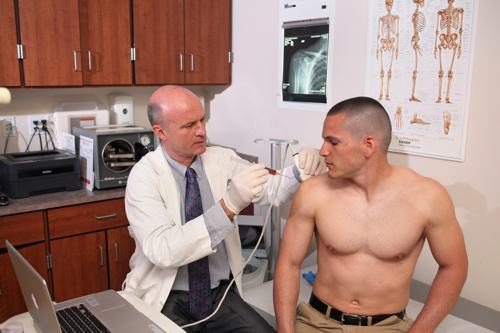Shoulder
Covington Orthopedic and Sports Medicine Institute provides both non-surgical and surgical treatment for shoulder conditions resulting from injury or trauma, as well as the treatment of chronic shoulder disorders which produce pain, limiting range of motion, or contributing to shoulder instability.
The more common causes of shoulder conditions are the result of injury, trauma, excessive range or repetitive shoulder motion, or excessive or repetitive shoulder motion frequently associated with sports activities. Repetitive occupational movement, particularly overhead movement can also lead to should conditions.

Proper diagnosis of shoulder injuries and conditions, as well correct treatment such as physical therapy are necessary to assure correct function of the shoulder joint into the future. Inadequate treatment may result in stiffness, limitation of motion – as in frozen shoulder – or improperly healed muscle, tendon, ligament, and soft-tissue leading to chronic pain or increased frequency of dislocation of the shoulder joint.
Shoulder Injuries
Shoulder Burners and Stingers
Characterized by a surge of pain traveling from the shoulder down to the hand – in a burning or stinging sensation – burners and stingers are the result of an applied force driving the individual’s head downward and sideways away from the shoulder. This forced, stretching head motion impinges on the surrounding nerves supplying the upper arm. Contact sports and injury are the leading causes of burners and stingers.
Rotator Cuff Tear
The covering composed of both muscle and ligament securing the head of the upper arm bone (humerus) into the shoulder socked is known as the rotator cuff.
The rotator cuff is susceptible to tearing as a result of overuse sustained for a period of years, as well as injury, trauma, fracture, and dislocation. Rotator cuff tears can result in either acute or chronic pain. Athletes, weightlifters, and workers participating in activities with a great range of shoulder motion – or overhead shoulder motion in particularly – are susceptible to rotator cuff tears. The frequency of tears among individuals in excess of forty years of age increases.
Dislocated Shoulder
A shoulder dislocation is the result of the head of the upper arm bone (humerus) becoming either partially (subluxation) or entirely dislodged from the shoulder socket (glenoid). Resulting symptoms may include painful shoulder spasms, shoulder swelling, shoulder numbness, shoulder weakness, and bruising. More aggressive shoulder dislocations may also result in ligament tears, tendon tears, shoulder nerve damage, and damage to the shoulder socket’s soft fibrous tissue rim (Labrum). Many dislocations are the result of sustained wear on the cuff through lifting and repetitive motion. Accurate diagnosis – including the identification of tendon, ligament, nerve and tissue damage – as well as the cause and direction of the dislocation are important factors in determining the best course of treatment. Improper or insufficient treatment may lead to shoulder instability; the propensity for additional dislocations.
Chronic Shoulder Instability
As the shoulder’s rotator cuff muscles, ligaments, and tendons are loosened or weakened through wear, damaged by injury, tear, or dislocation they may become less effective in keeping the upper arm bone correctly seated in the shoulder socket. Dislocation of the shoulder can increase in frequency, or dislocation may result from less range or frequency of motion, or milder injury than initially experienced producing a dislocation. This ongoing reduction in the shoulder’s capacity to correctly confine the humerus within the rotator cuff is referred to as chronic shoulder instability.
Shoulder Joint Tear
As much as fifty-percent of the shoulder socket is comprised of a soft fibrous tissue (labrum), which aids in securing the upper arm bone in place. The shoulder’s range of rotational motion and use in activities and repetitive motion, as well as susceptibility to acute injury and trauma can expose the labrum to tissue damage and tears. Continued wear through athletics or weightlifting can increase the likelihood of labrum damage.
Shoulder Impingement
An impingement of the shoulder is a common condition producing a painful limit to the range of shoulder motion. The shoulder impingement condition is the result of the front edge of the shoulder blade compressing against the rotator cuff during shoulder motion or rotation.
Frozen shoulder
Frozen shoulder produces pain and stiffness, as well as a limitation in the shoulder joint’s range of motion. The condition is the result of the thickening and shortening of the muscles, ligaments, or tendons (contracture) of the shoulder joint’s rotator cuff and is associated with aging, and in some cases, failure to employ physical therapy for the shoulder joint following the treatment of a condition or injury.
Reviews
Covington Ortho has the happiest patients in the Greater New Orleans North Shore Market
